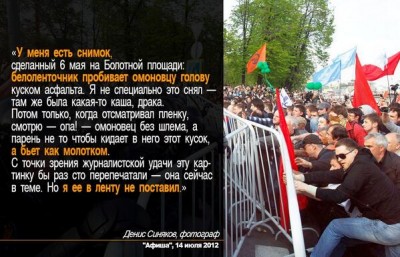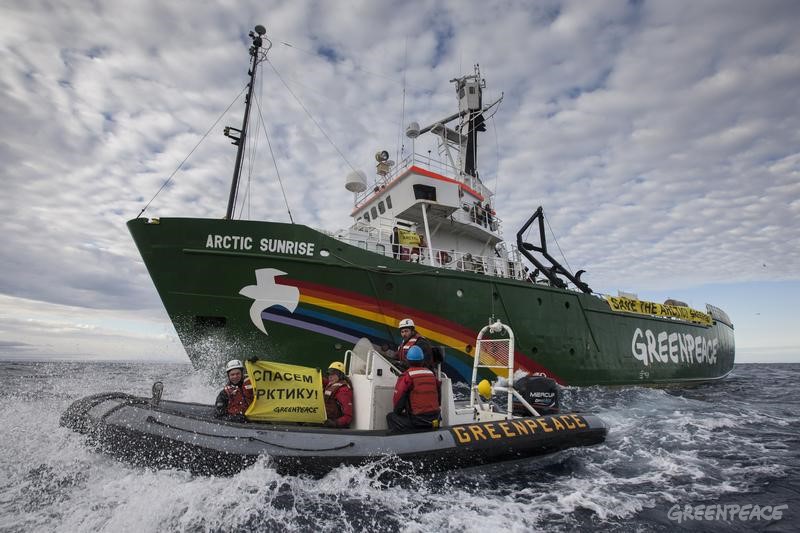While piracy off the Horn of Africa [2] has become commonplace in recent years, the remote and frigid waters of the Barents Sea offer little attraction to modern day buccaneers. According to the Russian government however, piracy is exactly what the crew of the Greenpeace vessel, MY Arctic Sunrise [3], were engaged in when they were detained by Russian coast guard. The ship was protesting state-owned energy giant Gazprom's new Arctic oil-rig, “Prirazlomnaya.” Greenpeace maintains that Arctic drilling represents a grave threat to the environment and that Gazprom has failed to implement [4] adequate safeguards.
On September 18, 2013, two members of the vessel attempted to occupy the rig and were detained by Russia's Coast Guard [5]. According to Greenpeace, members of the Coast Guard fired shots across the vessel's bow. After the Arctic Sunrise refused to allow members of the Coast Guard to board (Greenpeace claims the vessel was in international waters [6] at this point), the ship was boarded forcibly. The crew used their twitter account to relay the events in real time.
The Coast Guard has stopped communicating with us, and is no longer demanding to board the Arctic Sunrise.
— Arctic Sunrise (@gp_sunrise) September 18, 2013 [7]
BREAKING: Helicopter hovering above Arctic Sunrise, rope dropping down. We think the Coast Guard is boarding us. #SaveTheArctic [8]
— Arctic Sunrise (@gp_sunrise) September 19, 2013 [9]
This is pretty terrifying. Loud banging. Screaming in Russian. They're still trying to kick in the door. #savethearctic [10]
— Arctic Sunrise (@gp_sunrise) September 19, 2013 [11]
The 30-member crew of the vessel were placed under arrest and the ship was towed back to Murmansk [12]. While the detention of the crew was obviously enough to ruffle the feathers of Russia's environmentalists, word that freelance photojournalist Denis Sinyakov [13] [ru] was among those detained outraged Russia's journalists and opposition activists (many of whom know Sinyakov personally). Sinyakov has deep ties to the Russian opposition and was involved in shooting the art-collective/punk group Pussy Riot's latest video [14]. The outrage only grew when a Murmansk judge ruled that the crew would be held without charge [15] for two months while investigators determined what crimes they may have committed. Piracy carries a maximum sentence of 15 years in Russia.
Sinyakov's detention prompted protest from Russia's independent media. On Friday, September 27, 2013, the satellite TV channel Dozhd blacked out the photographs from its website in solidarity with Sinyakov and reported that “Lenta.ru, Gazeta.ru, Ekho Moskvy, Bol’shoi Gorod, Snob.ru. Argumenty i Fakty, Russian Reporter, The New Times, Svobodnaya Pressa, Osobaya Bukva, Znak.com, Russkaya Planeta and Yopolis.ru” were all planning to do the same.

The front page of independent newspaper “Novaya Gazeta” with the photos blocked out. Other websites have followed suit. Screenshot.
Over 100 Russian journalists signed an “Open Letter in Support of Denis Sinyakov [16]” [ru] in which they argued:
Во всем мире принцип невмешательства журналиста в происходящие события – краеугольный камень журналистской этики. Денис обладает в нашей среде безупречной репутацией – он снимал военные конфликты в Афганистане, Узбекистане, Южной Осетии. Нигде к нему не возникало претензий по поводу необъективности и принятии позиции одной из сторон.
All over the world the principle that a journalist does not interfere in ongoing events is the cornerstone of journalistic ethics. Denis enjoys an unsullied reputation among us [journalists]. He has shot military conflicts in Afghanistan, Uzbekistan and South Ossetia. He has never been accused of a lack of objectivity or bias to any side.
Not everyone was so convinced of Sinyakov's objectivity. Popular pro-Kremlin bloggers like Stanislav Apetyan [17] [ru] and Marina Yudenich [18] [ru] were quick to draw attention to a quote Sinyakov gave in an interview [19] [ru] with the culture magazine Afisha in July 2012. Apetyan tweeted the quote superimposed over an image of disorder from the infamous Bolotnaya Square protests [20] [Global Voices report]:

Sinyakov quote with images of Bolotnaya protests. (Used with author's permission)
I have a photo I took on the 6th of may on Bolotnaya Square. A white ribboned [protester] is beating a member of the riot police over the head with a piece of asphalt. I wasn't specifically photographing that [event], everything there was mixed up, there was fighting. Only, when I developed the negatives later I saw – whoa! – a riot cop without a helmet, and the lad wasn't throwing the piece at him, he was beating him over the head with it like a hammer. From a journalistic point of view, this picture would have been printed a hundred times over — it was very current. But I didn't put it in my media feed.
While Sinyakov's close links to opposition figures and art-groups like Voina [21] and Pussy Riot obviously don't endear him to figures like Apetyan, blogger and politician Alexey Navalny [22] (who has spent a bit of time in Russian jails) saw fit to remind his followers of the larger issues at stake:
Справедливости ради надо сказать, что арестовывать совершенно не за что не только Синякова, но и всех, кто был на корабле.
— Alexey Navalny (@navalny) September 26, 2013 [23]
In all fairness, I have to say that not only Sinyakov but the entire crew was arrested for no good reason.
This may well be where the Coast Guard overstepped its mark. While the Russian government has been incredibly hostile to NGOs, the Russian public consistently ranks environmental pollution [24] [ru] as serious concern, with 25% of Russians “very alarmed” at environmental conditions where they live and 49% “somewhat alarmed.” Environmental concerns over a nickel mine in Voronezh even led to rioting [25] [Global Voices report] this year, indicating there may be more sympathy for environmentalists in Russia than the Kremlin might believe. Similarly, while Western states have themselves used excessive force [26] in dealing with Greenpeace in the past, the detention of over a dozen foreign nationals is likely to become a diplomatic headache for Russia. Even President Putin has stated that the protesters may have broken the law but clearly are not pirates [27]. Whether this will be enough to get them out of an Arctic prison before the winter comes remains to be seen.
